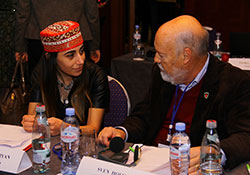Second Partners Meeting of the Better Labs for Better Health initiative, 1–2 December 2016, Tbilisi, Georgia

In 2012 the WHO Regional Office for Europe launched the Better Labs for Better Health initiative to improve laboratory services fundamentally in countries in eastern Europe and central Asia, including building the capacities required under the International Health Regulations (2005) (IHR).
The First Partners Meeting of the Better Labs for Better Health initiative was held in 2014 in Copenhagen, Denmark. The Second Partners Meeting in Tbilisi, Georgia, reviewed achievements to date in laboratory system strengthening towards IHR implementation and in improving laboratory quality and maintenance, and explored models for public health laboratory systems. It also aimed to bring together laboratory specialists from different sectors, countries, projects and partners in order to share experiences.
Participants included representatives of the Member States currently implementing the Better Labs for Better Health initiative (including Kyrgyzstan, the Republic of Moldova, Tajikistan, Turkmenistan and Uzbekistan) and other interested countries of the Newly Independent States; partners and donors; professional associations in the areas of laboratory quality and biosafety; and representatives from WHO country offices, regional offices and headquarters and other United Nations organizations.
The meeting concluded that:
- countries that have developed national laboratory policies and strategies have made significant steps towards improving their laboratory systems;
- the national laboratory working groups that have been established are a key resource and point of entry to countries and partners;
- a top priority is to improve the regulatory framework for laboratories, and a number of countries have made important progress in this area;
- continued coordination and collaboration with international partners and projects is essential;
- the discussion on public health laboratory systems provided a way forward to develop case studies and guidance of use for countries going through reform.
The meeting also held a joint session with the European Tuberculosis Laboratory Initiative, during which laboratory maintenance issues were discussed.



